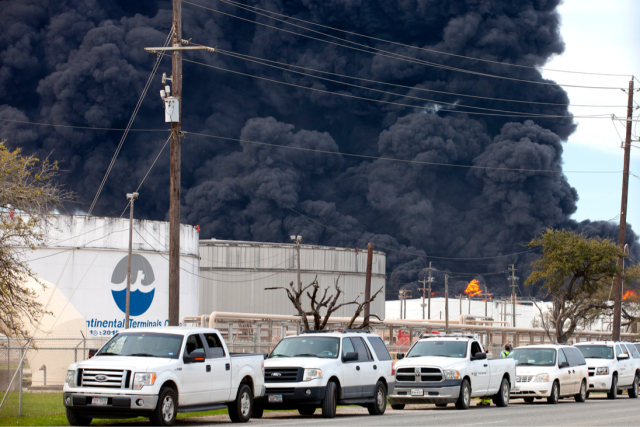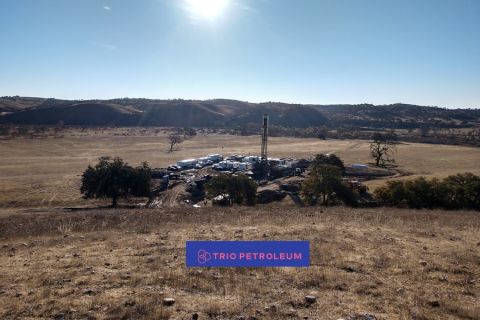
Smoke rises from the International Terminals Company fire in Deer Park, Texas, in March. (Source: Shutterstock.com)
Learn more about Hart Energy Conferences
Get our latest conference schedules, updates and insights straight to your inbox.
An often overlooked segment of the energy industry involves liquid terminals and the vital role they play in the storage and transportation of liquids products.
Two recent incidents in the Houston area, one of them causing a fatality, have attracted unwanted public attention to the large number of tank farms that surround the Gulf Coast. On March 17, a fire erupted in property owned by Intercontinental Terminals Company (ITC) in Deer Park, Texas. The fire reignited after it was initially extinguished, eventually taking three days to put out. Nearby businesses and tourist attractions were forced to close for weeks, shipping was halted in the Houston Ship Channel, and environmental concerns have still not abated. Damages may total $1 billion as numerous lawsuits have been filed and investigations continue.
On April 3, a fire broke out in a chemical holding tank on property owned by KMCO. One worker was killed, and two others seriously injured.
In the ITC fire, a safety expert told reporters that most companies lack fixed-fire protection systems because national codes and standards only require companies to have the infrastructure in place for firefighters to flow foam and water onto the tank. Had ITC been outfitted with such a system that he said would cost about $1 million, the fire could have been extinguished within minutes.
The International Liquid Terminals Association (ILTA) represents the interests of the tank terminal industry which includes other industries in addition to energy products. It is a large business that continues to grow but doesn’t receive the same amount of attention as other industry segments due to its clustered nature.
As ILTA has grown, it has also expanded its leadership to include highly regarded executives with a knowledge of energy products and strategy. The strongest example is its president and CEO, Kathryn Clay, who was hired away from the American Gas Association in January 2018 after five years as executive vice president for policy. She has also worked on Capitol Hill for Senate and House Energy and Science committees and subcommittees. Clay has a Ph.D. in applied physics and a master’s of science in electrical engineering from the University of Michigan.
“The terminal industry of today is more innovative, and more dynamic, than ever,” she said. “Global markets for crude oil, petroleum products and chemicals are changing, and that means trade flows are evolving as well. Tank terminals are essential to facilitate these shifts in global trade, and we are seeing new construction and expansion as a result.
“We are also seeing shifts in the regulatory environment for terminals, particularly at the local and state levels,” she continued. “For ILTA, this means we will need to grow and evolve to serve our members even better going forward.”
Over the past year, ILTA has moved to position itself as a stronger voice in Washington, D.C. Two key advocacy staffers were recently hired—veteran lobbyist Andy Wright as vice president of legislative affairs, and Cathy Landry, former vice president of communications with the Interstate Natural Gas Association of America (INGAA) and INGAA Foundation, as senior director of strategic communications. They join Peter Lidiak, a former executive with the American Petroleum Institute, who is vice president of legislative affairs.
Their wealth of experience will enable ILTA to take its advocacy, communications, and member services to the next level, Clay said.
“We are in a rebuilding stage at ILTA. I’ve been president for just over a year, and I’ve been hiring a world-class staff,” she said. “One thing we have clearly heard from our board of directors is that they want us to expand advocacy in Washington and beyond. The great news is we’ve already made some real strides toward building up our advocacy team, and we are eager to make ILTA an even more effective voice for the terminal industry.”
Staffers with energy experience are vital for ILTA, as recent advances are driving the terminal industry, she explained.
“In the United States, the shale revolution and how that’s reshaping the energy landscape is monumental for the terminal industry,” Clay said. “I think we all hear a lot about the need for new pipelines to move supply out of constrained basins, like the Permian, and new ports to export crude oil and products. But we don’t hear as much about how terminals are affected—and they are.
“As you know, every barrel that is exported spends at least part of its life in a terminal. If the U.S. is going to reach its enormous export potential—and the U.S. Energy Information Administration, estimates crude oil exports of about 8 million barrels per day over the next four years—we are going to need terminal expansion as well. Safety and security always remain top of mind and a top priority for the industry.”
Which is why ILTA cannot afford to shy away from the Deer Park fires, which headlined the national news for several days. Clay said the industry is determined to benefit from lessons learned.
“ILTA and its member companies are committed to continuous improvement in all aspects of the safety of our facilities. We are committed to learning as much as we can about both the cause of the incident and the response to the Deer Park incident,” Clay said.
“We are aware that the U.S. Chemical Safety Board, an independent federal agency, has begun an investigation into the incident. The CSB’s investigation and findings – and those by other local, state and federal regulators—will be shared with the larger industry. We recognize this as an opportunity for the entire terminal and storage industry to identify areas where improvement is needed. We want to use any insights gained from the investigations to dramatically reduce the odds that an incident like this will happen again.”
Clay said ILTA will continue to convene subject-matter experts from within its membership through the Environmental, Health, Safety and Security Committee to discuss best practices, guidelines and other operational issues to improve the industry’s safety and environmental stewardship.
“We will also bring together industry professionals to share lessons learned from incidents and near-misses. We hold a Terminal Operating Practices Symposium (TOPS) to facilitate peer-to-peer exchange and elevate safety awareness for all participants. The TOPS event is one way we support our members’ efforts to keep safety culture top-of-mind for their employees.”
At the upcoming June 3-5 annual trade conference and trade show in Houston, ILTA members intend to discuss safety, best practices and the newest tools and products available to promote best operating practices, safety, emergency response and environmental protection, she said.
This also marks an appropriate opportunity for non-members to join ILTA’s 86 terminal members and about 400 supplier members, Clay said.
“Despite some consolidation within the industry, we are confident that our membership will continue to grow. I think the industry is seeing a real value in ILTA, particularly as we expand our advocacy function.
“We want to encourage all terminal operators to join ILTA because we truly believe that we can help the industry continue to raise the bar on safety. The more participation we have from across the entire industry, the more effective we can be as an association. Recruiting new members, including smaller members, is something ILTA intends to focus on in the next year.”
With the increasing role that liquid facilities play in the energy industry, earlier this year ILTA convened a group of terminal company executives on Capitol Hill for a full day of meetings with key lawmakers and their staffs. Together, she said, they presented their case on key legislative issues that affect the industry.
“We spoke with them about the importance of rededicating the Harbor Maintenance Trust Fund (HMTF) to its original purpose—investing in maintenance and improvements for our nation’s ports, waterways, and harbors” she said. “We also asked Congress to ensure proper treatment of gasoline, diesel, and fuel mixtures under the Chemical Facilities Anti-Terrorism Standards (CFATS) Act as it proceeds with reauthorization of the program this year.”
“We also took the opportunity to thank Congress for listening to our industry and enacting legislation to require the U.S. Department of Homeland Security to study the effectiveness of the Transportation Worker Identification Credential (TWIC) before it can finalize requirements for biometric readers at port and terminal facilities,” Clay said.
Another important area of ILTA advocacy on behalf of membership is engagement with the Surface Transportation Board (STB) regarding proper demurrage charging assessments from railroad companies. Through meetings with the three members of the “unintended consequences of current policies that allow terminals to be charged for system delays and inefficiencies that are outside the terminal’s control or responsibility.’
“We are also pleased that the Supreme Court recently agreed to hear Frescati vs CARCO, a case concerning the liability of terminal owners under 'safe berth' clauses in maritime contracts. ILTA and the American Fuels & Petrochemical Manufacturers Association filed an amicus brief asking the Supreme Court to consider the case. Since the Supreme Court accepts only 0.2% of cases for consideration, we appreciate this as an acknowledgment of the importance of the issue.”
Recommended Reading
E&P Highlights: April 15, 2024
2024-04-15 - Here’s a roundup of the latest E&P headlines, including an ultra-deepwater discovery and new contract awards.
Trio Petroleum to Increase Monterey County Oil Production
2024-04-15 - Trio Petroleum’s HH-1 well in McCool Ranch and the HV-3A well in the Presidents Field collectively produce about 75 bbl/d.
Trillion Energy Begins SASB Revitalization Project
2024-04-15 - Trillion Energy reported 49 m of new gas pay will be perforated in four wells.
Exxon Ups Mammoth Offshore Guyana Production by Another 100,000 bbl/d
2024-04-15 - Exxon Mobil, which took a final investment decision on its Whiptail development on April 12, now estimates its six offshore Guyana projects will average gross production of 1.3 MMbbl/d by 2027.
US Drillers Cut Oil, Gas Rigs for Fourth Week in a Row-Baker Hughes
2024-04-12 - The oil and gas rig count, an early indicator of future output, fell by three to 617 in the week to April 12, the lowest since November.




